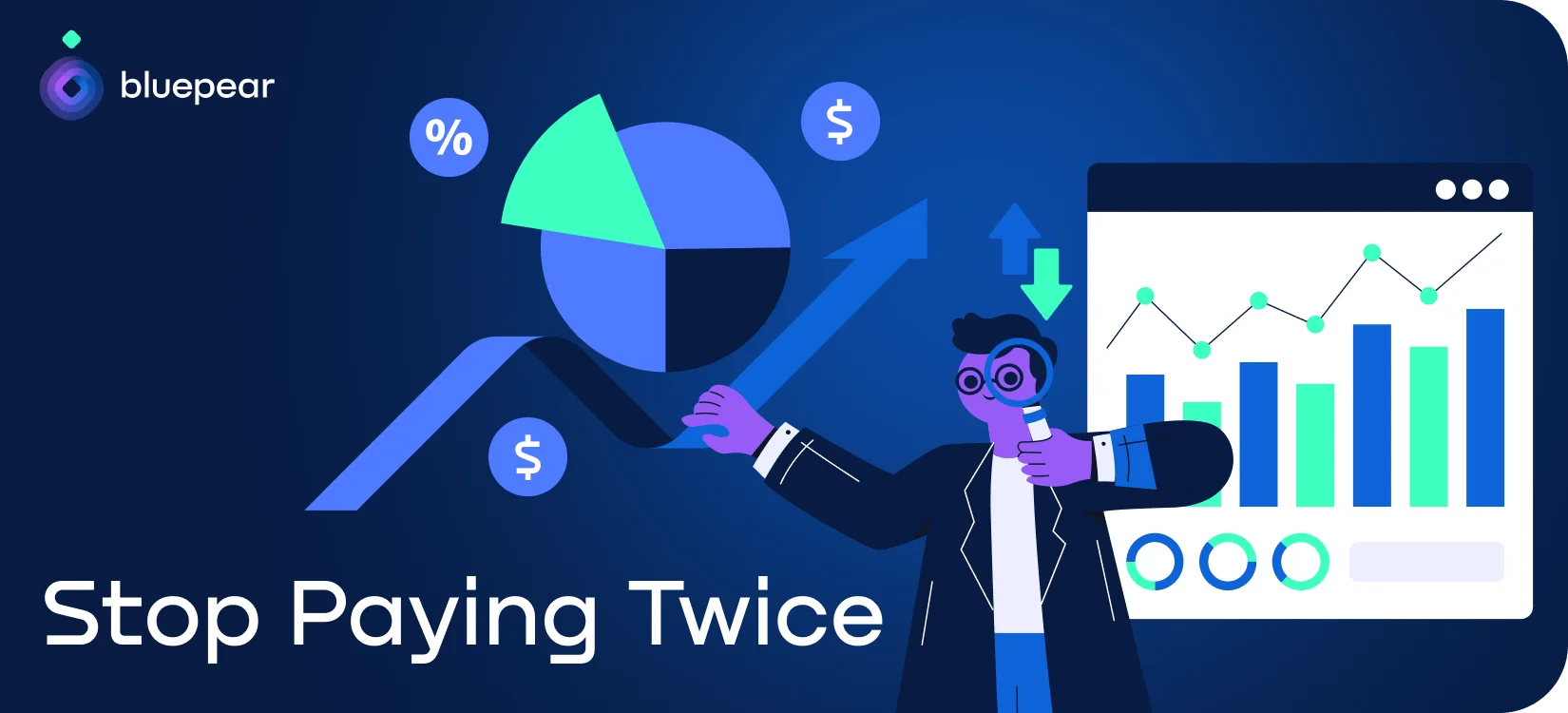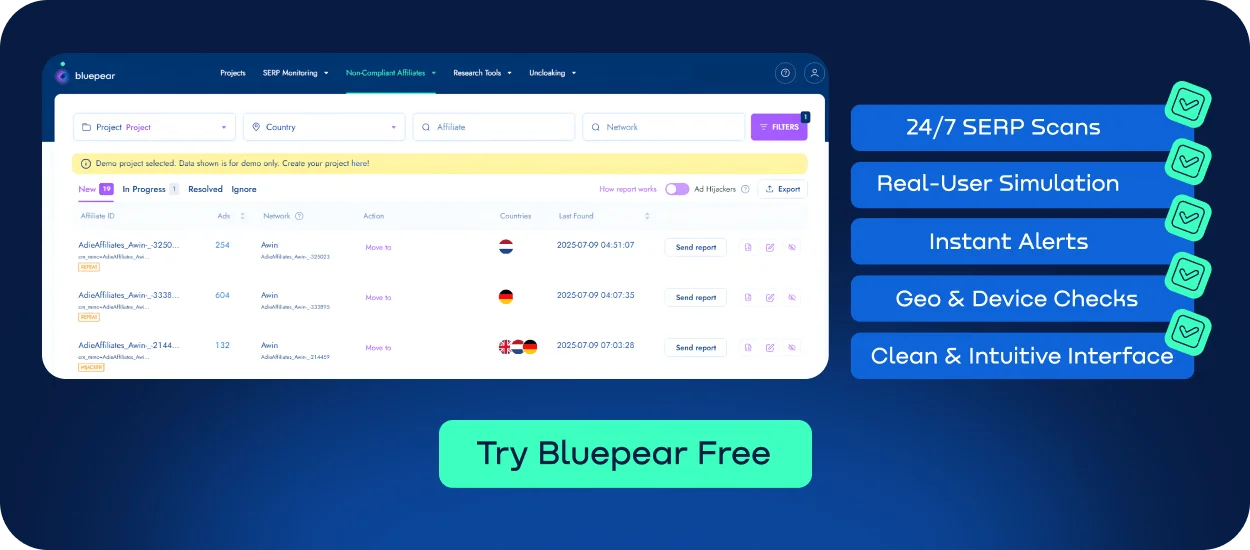
Contents
Introduction
Arbitrage is becoming an increasingly pervasive issue in performance marketing. Search arbitrage is a tactic where affiliates purchase low-cost traffic — often by bidding on your own branded keywords—and reroute it through monetized landing pages to capture profit on the margin.
And the impact? In 2025, global losses due to advertising fraud are projected to reach $84 billion, with affiliate CPC abuse representing a significant and growing segment of this overall figure. While exact proportions are not specified, affiliate CPC abuse is highlighted by Search Engine Land as a key driver of these losses through tactics such as click injection, cloaking, and fake coupons — a common pattern in click fraud.
This isn’t just a case of inefficient spending. It's a strategic threat.
Affiliates engaging in search engine arbitrage are effectively outbidding you on your own terms, intercepting valuable brand traffic, and driving up your paid search costs—while distorting attribution models and analytics. Left unchecked, this practice can severely undermine both ROI and trust in your affiliate channel.
What is Search Engine Arbitrage?
Search engine arbitrage, also a subtype of media arbitrage, is a tactic where publishers or affiliates buy traffic from one source — typically paid search — at a low cost per click (CPC), and monetize it through another source with higher CPC or CPA payouts.
Here’s how it typically works:
- 1. Low-cost traffic acquisition. Affiliates bid on long-tail queries, generic product terms, or even your exact branded keywords at minimal CPC rates.
- 2. Redirection to monetized pages. These users are sent to landing pages filled with premium ad placements or affiliate links offering higher commissions.
- 3. Revenue capture through arbitrage. Affiliates earn the spread between what they pay for traffic and what they generate through monetization.
At first glance, this model may seem like a smart form of arbitrage marketing. But when deployed within an affiliate program — especially without strict compliance oversight — it opens the door to CPC fraud.
Why is this problematic?
- • Misattributed conversions: Affiliates gain credit for users they didn’t organically acquire.
- • Inflated traffic costs: Brands are forced to outbid affiliates for their own keywords.
- • Misleading analytics: Marketing teams misread campaign performance, shifting budget to inefficient sources.
In reality, affiliates engaging in search arbitrage don’t grow your customer base — they exploit your brand equity. This not only distorts your paid media strategy but often masks itself as high-performance affiliate activity, making it harder to detect without dedicated monitoring tools.
How Affiliate CPC Arbitrage Hurts Brands
Affiliate-driven search arbitrage can quietly eat away at your paid media performance, often without triggering immediate alarms. But the consequences compound over time.
Rising CPCs on Branded Terms
Affiliates engaging in search engine arbitrage frequently bid on your branded keywords—terms that should drive cost-effective, high-converting traffic. As a result, your internal paid search team is forced to compete with partners for visibility. The outcome? A measurable spike in CPC, and eventually, a diminishing return on ad spend.
Hijacking High-Intent Traffic
Your branded queries attract users already familiar with or interested in your business. But when affiliates intercept this traffic through media arbitrage, they capture value without delivering incremental results. This isn't growth; it’s diversion. These users would likely have converted directly, yet now you’re paying commissions on what should’ve been organic or direct sales.
Distorted Analytics and ROI
One of the most dangerous side effects of arbitrage marketing is how it warps attribution. For example, your dashboards might show increased click-through rates and higher conversion numbers, but these lifts are often artificial — driven by low-quality or fraudulent traffic. As a result, the real ROI declines while vanity metrics spike. Marketing teams risk making budget decisions based on manipulated data, which only reinforces ineffective campaigns and drains resources.
Brand Reputation at Risk
Some affiliates take it a step further—using ad hijacking, cloaking, misleading ad copy, or unauthorized promotions. This not only confuses users but also puts your brand reputation in jeopardy. Left unchecked, this behavior can escalate into full-fledged affiliate scams, damaging consumer trust and partner relationships alike.
Red Flags of Affiliate Search Arbitrage
Wondering whether your program is affected? Here are the most common signs:
1. Unexplained Spikes in Branded CPC
If your internal campaigns suddenly experience rising costs on brand terms, affiliates may be inflating bids through search arbitrage. Always cross-reference CPC movements with affiliate activity.
2. Irregular Geo or Device Traffic Patterns
Look out for sudden surges in traffic from countries or devices outside your normal audience scope. These anomalies often signal media arbitrage campaigns trying to source low-cost clicks from fringe segments.
3. Traffic Spikes With Flat or Declining Conversion Rates
High traffic with poor performance can indicate arbitrage activity. Affiliates are driving volume—not value. Your cost per acquisition may climb while conversions stagnate.
4. Landing Page Substitution or Cloaking
Some affiliates redirect users through intermediate landing pages to track or mask behavior. Others use cloaking ads to show different content to search engines vs. users. Without active surveillance, this goes unnoticed.
5. Lack of Real-Time Monitoring Tools
The biggest red flag? Flying blind. Without robust affiliate monitoring in place, most brands remain unaware of ongoing abuse until the damage is already done.
Detect and Prevent Affiliate Arbitrage With Bluepear
Conventional keyword monitoring tools struggle to keep pace with today’s sophisticated affiliate tactics, especially in tackling complex arbitrage marketing and media arbitrage schemes. These tools often fail to emulate real user journeys, miss cloaking or dynamic redirects, and overlook mobile- or geo-targeted attacks. Bluepear changes the game — not by automatically blocking arbitrage, but by providing detailed, actionable data that empowers marketing teams to quickly identify suspicious activity and respond effectively. Rather than cleaning campaigns on its own, Bluepear acts as a powerful detection and alert system, giving you the insights needed to take control and protect your program before damage escalates.
Here’s how it works:
Real-User Simulation: Bluepear mimics authentic user behavior across devices, locations, and browsers.
GEO & Device-Specific Crawls: It audits how your affiliate ads appear in different markets—catching localized search arbitrage in action.
Redirect and Cloaking Detection: Finds hidden landing pages, sneaky redirects, and unapproved campaign flows.
Visual Proof: Generates instant screenshots of violations and delivers alerts directly to your compliance or media team.
Affiliate monitor capabilities are embedded into every scan, ensuring 24/7 coverage of your brand
With vs. Without Monitoring
| Without Monitoring | With Bluepear | |
|---|---|---|
| Branded CPC | Frequently inflates | Stays stable |
| Brand Traffic | Lost to affiliate bidding | Protected and prioritized |
| Conversion Accuracy | Distorted by cloaking | Clean, verified attribution |
| Affiliate Violations | Detected late or never | Flagged instantly with proof |
| ROI on Paid Campaigns | Declines over time | Recovers and scales efficiently |
Case Study: How One Brand Recovered $250K Lost to CPC Fraud
Let’s break it down with a real-world scenario (anonymized for privacy).
A fast-growing DTC brand noticed rising CPCs and a flattening conversion curve—despite increasing their ad budget. Upon deploying Bluepear, they discovered:
- • 11 affiliates bidding on their branded terms
- • Cloaked redirect chains masking final destinations
- • Traffic from low-quality GEOs generating zero conversions
Within 30 days of active monitoring and enforcement, they:
- • Eliminated 85% of arbitrage traffic
- • Recovered over $250K in lost ad spend
- • Increased branded campaign ROI by 32%
This is the kind of visibility that pays for itself.

Best Practices to Protect Your PPC Campaigns
To future-proof your paid search and affiliate performance, it’s essential to conduct regular affiliate audits and learn how to monitor competitors’ PPC ads to uncover hidden bidding tactics before they inflate your costs.. Establishing strict PPC rules within your partner agreements helps set clear boundaries and expectations.
Additionally, leveraging advanced affiliate monitoring platforms provides the necessary oversight to spot anomalies early and safeguard your campaigns. Regularly reviewing attribution paths is also critical to detecting unusual patterns that may indicate arbitrage activity.
Bluepear is purpose-built to deliver on all these fronts and more. Curious to see how it works? Try a live demo today.
Conclusion
And what is search engine arbitrage? It isn’t just a technical issue—it’s a strategic vulnerability in affiliate programs that directly impacts marketing budgets, analytics integrity, and brand control. It allows affiliates to quietly profit from your own campaigns while inflating your CPC and cannibalizing organic performance. I t's a form of arbitrage marketing where affiliates buy low-cost traffic—often by targeting your branded keywords and reroute it through monetized landing pages to earn the difference. The tactic may seem clever, but its cost to your business is very real.
Bluepear was built specifically to counter these tactics. By simulating real-user behavior, uncovering cloaked pages, and surfacing hidden affiliate activity, it enables performance marketing leaders to take back control.
If you're serious about protecting your ROI and restoring clarity to your affiliate data, start with visibility.
FAQ
What is search engine arbitrage?
It’s a tactic where affiliates or publishers buy cheap traffic and redirect it to higher-paying ad or affiliate offers, pocketing the difference.
How do I know if affiliates are using CPC arbitrage?
Watch for branded CPC spikes, low-converting high traffic, irregular GEO/device activity, and unauthorized landing pages.
What tools can detect affiliate PPC fraud?
Conventional analytics tools often miss it. Purpose-built platforms like Bluepear offer real-time monitoring, cloaking detection, and visual proof.
Why is affiliate monitoring essential in 2025?
Affiliate fraud is becoming more sophisticated and harder to catch. Real-time monitoring is the only way to stay ahead.
Can Bluepear stop affiliate arbitrage?
Yes. Bluepear detects and documents affiliate PPC violations, giving you the evidence needed to take fast action and stop budget leaks.

